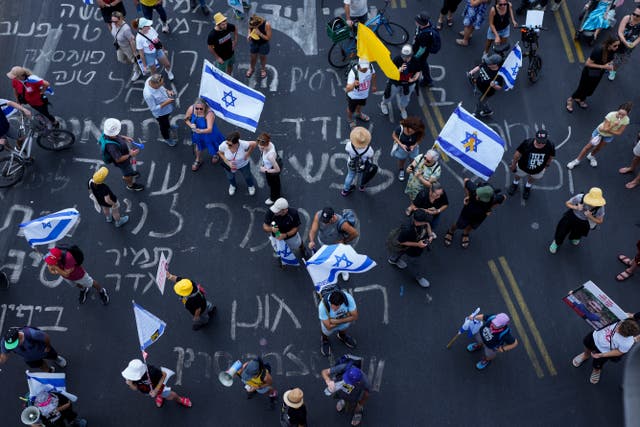Strike disrupts Israel while Biden says Netanyahu not doing enough to reach deal
The strike was ignored in some areas, reflecting deep political divisions in Israel over a ceasefire deal after nearly 11 months of fighting.

A rare general strike in Israel to protest over the failure to return hostages held in Gaza has led to disruption around the country.
US President Joe Biden added to the pressure by saying Israeli Prime Minister Benjamin Netanyahu is not doing enough to reach a deal for a ceasefire and hostage release.
The strike was ignored in some areas, reflecting deep political divisions in Israel over a ceasefire deal after nearly 11 months of fighting.

It appeared to be the largest protest since the start of the war.
The families and much of the public blamed Mr Netanyahu, saying they could have been returned alive in a deal with Hamas.
But others support Mr Netanyahu’s strategy of maintaining military pressure on Hamas, whose October 7 attack into Israel triggered the war.
They say it will force the militants to give in to Israeli demands, potentially facilitate rescue operations and ultimately annihilate the group.
Mr Biden spoke to reporters as he arrived at the White House for a Situation Room meeting with advisers involved in negotiating a deal.
Asked if Mr Netanyahu was doing enough, Mr Biden responded: “No.”
He insisted that negotiators remain “very close” to a deal, adding: “Hope springs eternal.”
Hamas has offered to release all hostages in return for an end to the war, the complete withdrawal of Israeli forces and the release of a large number of Palestinian prisoners, including high-profile militants – broadly the terms called for under an outline for a deal put forward by Mr Biden in July.
Mr Netanyahu has pledged “total victory” over Hamas and blames it for the failure of the negotiations, which have dragged on for much of this year.
Israeli media have reported deep differences between Mr Netanyahu and top security officials, including defence minister Yoav Gallant, who say the time is ripe for a ceasefire.
An official confirmed a shouting match between Mr Gallant and Mr Netanyahu at a security cabinet meeting on Thursday, where Mr Netanyahu held a vote in favour of maintaining control over the Philadelphi corridor, a stretch of land along Gaza’s border with Egypt that Israel says is used by Hamas to smuggle weapons – a claim Egypt and Hamas deny.
Mr Gallant cast the lone vote against the proposal, saying Mr Netanyahu was favouring border arrangements over the lives of hostages.
The official spoke on condition of anonymity to discuss the closed-door meeting.

Khalil al-Hayya, the Hamas official leading the negotiations, told the Qatari network Al Jazeera late on Sunday that Mr Netanyahu had deemed keeping the Philadelphi corridor “more important” than winning the hostages’ release.
Al-Hayya also said Hamas had offered “great flexibility”, including reducing its demand for 500 Palestinian prisoners to be released in exchange for each captive Israeli soldier to 50, and from 250 Palestinian prisoners for each Israeli civilian hostage to 30.
He accused Israel of introducing new conditions, including increasing the number of prisoners who would be deported upon release and banning the release of elderly or ill prisoners serving life sentences.
Israel said the six hostages found dead in Gaza were killed by Hamas shortly before Israeli forces arrived in the tunnel where they were held.
Three were reportedly scheduled to be released in the first phase of a ceasefire proposal discussed in July.
The Israeli Health Ministry said post-mortem examinations had determined the hostages were shot at close range and died on Thursday or Friday.
Thousands attended the funeral on Monday for one of the six, Israeli-American Hersh Goldberg-Polin, a 23-year-old native of Berkeley, California.
He was one of the best-known hostages, and his parents had led a high-profile campaign for the captives’ release, meeting with Mr Biden, Pope Francis, and addressing the Democratic National Convention last month.

It was the first such strike since the start of the war, aiming to shut down or disrupt major sectors of the economy, including banking and healthcare.
Airlines at Israel’s main international airport, Ben-Gurion, halted outgoing flights between 8am and 10am.
Those flights either departed early or were slightly delayed.
Arriving flights continued as usual, according to the Israel Airports Authority.
“There’s no need to punish the whole state of Israel because of what is happening, overall, it is a victory for Hamas,” said one passenger, Amrani Yigal.
The Histadrut said banks, some large shopping centres and government offices had joined the strike, as well as some public transit services, although there did not appear to be major disruptions.
Municipalities in Israel’s populated central area, including Tel Aviv, participated, leading to shortened school hours.
Other municipalities, including Jerusalem, did not participate.
Organisers of the demonstrations on Sunday estimated that up to 500,000 people joined nationwide events and the main rally in Tel Aviv.
Israeli media estimated that 200,000 to 400,000 took part.
Many demand that Mr Netanyahu reach a deal to return the remaining roughly 100 hostages held in Gaza, a third of whom are believed to be dead, even if it means leaving a battered Hamas intact and withdrawing from the territory.
Other Israelis prioritise the destruction of the militant group over freedom for the hostages.

More than 100 were freed during a ceasefire in November in exchange for the release of Palestinians imprisoned by Israel.
Eight have been rescued by Israeli forces.
Israeli troops mistakenly killed three Israelis who escaped captivity in December.
Hamas-led militants killed some 1,200 people, mostly civilians, when they stormed into southern Israel on October 7.
Israel’s retaliatory offensive in Gaza has killed more than 40,000 Palestinians, according to local health officials, who do not say how many were militants.
The war has displaced the vast majority of Gaza’s 2.3 million people, often multiple times, and plunged the besieged territory into a humanitarian catastrophe, including new fears of a polio outbreak.





